PPMA OFFICERS
Marty Overlilne
President
Aardvark Pest Management
Phildelphia, PA
Adam Witt
President Elect
Witt Pest Management
Pittsburgh, PA
Keith Hamilton
Chairman of the Board
J.C. Ehrlich
State College, PA
BOARD OF DIRECTORS
Central Division
Gary Lesher
Governor
Perry Pest Control
Landisburg, PA
Leland Manuel
Pest-Rite
Manchester, PA
Keith Jones
Archer Pest Control
Camp Hill, PA
Eastern Division
Bryan Levengood
Governor
Thur-O Pest Mngmt
Elverson, PA
Mike Snyder
Township Pest Control
Warrington
, PA
Rob Byer
Terminix
Mountain Laurel
, NJ
Northeast Division
Jeff King
Governor
The Pest Rangers
Hanover Twp., PA
Paul Kutney
Diane Lown
Ajax Environmental Solutions
Dalton, PA
Western Division
Adam Witt
Governor
Witt Pest Management
Pittsburgh, PA
Scott Grill
Bill Grill Exterminating
Verona, PA
John Besic
Besic Pest Control
Transfer, PA
Technical Advisor
Chad Gore
Rentokil North America
Carnegie, PA
Industry Liaison
Brian Smith
Univar
Sharon Hill, PA
Executive Director
Versant Strategies
Harrisburg, PA
|
|
|
| Featured Article |
| What action, if any, do you want your members to take? Add a "Find out more" link to additional information that you may have hosted on your website. |
|
|
|
|
Dear Friends:
It was our honor to join members of PPMA at the State Leadership Forum at PestWorld in Baltimore last week. With the state legislature in session that day, we were drawn back to Harrisburg that same day to continue to protect and advocate for your interests. It was an amazing experience to work visit with the staff of NPMA and to engage with other state leaders and Executive Directors. We plan to continue to grow this network to better serve you, the membership.
Congratulations to Marty Overline who was awarded the Committee Chair of the year award for his work with the PestVets Committee.
Congrats, Marty!
If you haven't registered for the upcoming Annual Meeting, DO SO NOW! We will be meeting at the Eden Resort in Lancaster, PA. An agenda and online registration information is available online at http://www.papest.org/education-and-training/ppma-annual-conference/. Vendor registration information is also available at that link. Be sure to mention you are with the Pennsylvania Pest Management Association when making your hotel reservations for the special room rate.
If we at the Association's office can ever be of assistance, please feel free to contact us at (800) 842-9090 or cwright@versantstrategies.net.
Team Versant
|
|
|
|
NESDCA is excited to announce that we will be sponsoring certifications for our membership in Lancaster Pennsylvania on November 13th, 2017.
Teams wishing to participate in this NESDCA certification must complete the "Request a Certification" application at:
WWW.NESDCA.COM
Please note that to participate in this NESDCA certification you must be a current member of NESDCA.
If you are not a current NESDCA member then you only need to complete the application for certification at WWW.NESDCA.COM to begin processing your membership.
Certifications will take place from 8:00 a.m. to 2:00 p.m. at:
Eden Resort & Suites
222 Eden Rd
Lancaster, PA 17601-4216
Contact Peter Arnold at 570-351-4942 upon arrival for location information.
DUE TO LIMITED SPACE, ONLY TEAMS THAT HAVE REGISTERED AT WWW.NESDCA.COM WILL BE ABLE TO PARTICIPATE IN THIS CERTIFICATION.
|
|
|
Public comment period ends Dec. 15, 2017
September 28, 2017
UNIVERSITY PARK, Pa. - Farmers, gardeners and other Pennsylvanians concerned about the health of pollinators - given their critically important role in growing and producing food - now have the chance to comment on a draft of the state's proposed Pollinator Protection Plan.
The plan, developed by the Pennsylvania Department of Agriculture and the Center for Pollinator Research at Penn State, is designed to protect bees and other insects that pollinate nearly 75 percent of the Commonwealth's food crops.
"The Pennsylvania Pollinator Protection Plan is a living document that will change over time as researchers and interested citizens share personal experience and best practices when it comes to protecting and expanding pollinator populations," said state Agriculture Secretary Russell Redding. "Pennsylvania is blessed with rich soils and a favorable climate that allow us to produce a variety of agricultural products, but we need bees, flies and butterflies to pollinate three quarters of our food crops."
The department and Penn State's Center for Pollinator Research, which is housed in the College of Agricultural Sciences, developed the protection plan after the U.S. Environmental Protection Agency directed state agencies to develop pollinator protection plans to mitigate risk to honey bees and other pollinators. Pollinator populations have declined in recent years due to a number of threats.
According to Penn State researchers, beekeepers reported a 52 percent loss in their colonies during the winter of 2016-17. In addition, 51 species of butterflies, 111 species of moths and three species of bumble bees are considered to be at risk.
Each state is required to submit its own plan to EPA that provides technical advice to homeowners, beekeepers, farmers, nonagricultural landowners, businesses, organizations, government agencies and the public on how to improve and increase areas where bees and other pollinators can live safely, eat well and thrive.
Agriculture relies on pollinators for human health and economic stability. Researchers at the University of Pittsburgh and Penn State determined that Pennsylvania growers gain more than $250 million in fruit and vegetable production due to increased yield as a result of pollination from insects and an additional $9 million in value from crops where pollination produces seeds.
"Pennsylvania is the nation's fourth largest producer of apples, thanks in part to the work of about 235 species of bees found in our fruit orchards. It's easy to see the value of preserving and protecting the diversity of our pollinators," Redding continued. "Our apple harvest averages more than $124 million annually, so this plan is an integral part of maintaining our agricultural and economic viability in this and other fruit, vegetable and seed industries."
"Many of our favorite foods depend on bees, flies and others to transfer pollen between plants. They are critical to the success of our food supply," said Christina Grozinger, distinguished professor of entomology and director of Penn State's Center for Pollinator Research. "If you enjoy strawberries, raspberries, cherries, plums, peaches or pears, you can thank these pollinators."
Grozinger
encourages Pennsylvanians to review the first four chapters of the plan: "Introduction," "Best Practices for Forage and Habitat," "Best Practices for Pesticide Use," and "Best Practices for Beekeepers." The plan is available for review online at the Center for Pollinator Research website.
After the comment period ends on Dec. 15, the Pennsylvania Pollinator Plan's task force and advisory board will compile the public comments to create the fifth chapter, "Recommendations for Research, Education and Policy."
The plan was developed with input from 36 individuals representing 28 state and national organizations and stakeholder groups.
"I am very pleased with the final plan, which provides an outstanding framework for pollinator conservation and health in Pennsylvania and beyond," Grozinger said. "Members of the task force and advisory board have forged valuable partnerships, and our communities and our ability to feed a hungry world will be stronger for their efforts."
Media Contacts:
Chuck Gill
Work Phone:
814-863-2713
Twitter Handle:
|
Have any of you ever dealt with bed bugs in a multi-story building? We deal with it all the time and find these structures to be very challenging. Many of them are occupied by hundreds of people, many of whom are very social. They come and go using common elevators, frequent the community rooms and visit tenants on various floors of the building. A bed bug infestation in a building of this magnitude can be stressful to deal with and can spiral out of control very fast.
Treatments can also prove to be an obstacle because you are dealing with multiple people and different lifestyles. In a multi-story building you will find people who sleep on the floor, some on the couch and others in beds that look like they have been through war. Many times, sanitation is a problem. You can also encounter tenants that are handicap or have mental disabilities that prevent them from following the preparation procedures your company has in place. Sometimes taking a step back and looking over the situation you are faced with and trying a different approach will prove to be more efficient rather than demanding they follow your company policy. These people are often faced with challenges that no matter what you ask them to do- they won't or can't. Many companies use the same approach to treating bed bug infestations and while the saying often holds true "whether you have one or a hundred bed bugs treatment is the same" most times it is not. Once your customer is handed your preparation list they often clean house. Have you ever thought of this? They clean off their night stand in preparation for treatment so they take a DVD case and put it back on the rack possibly spreading these bugs to an area not prone to have clusters of bugs.
Treatments in these types of structures must consist of adjoining units to the left, right, above and below. As you advance through adjacent units you will often find other infested units and must continue inspecting and treating in pattern. If your client is against this practice make sure to have them sign off on your recommendation so when you are sitting in front of a judge you can provide the documentation to CYA. Documentation should be a company priority. Today, thirsty bed bug attorneys are popping up everywhere including the commonwealth and are visiting your clients looking to find fault with your client or their pest control provider.
Throughout the industry there are many options available to developing a proactive approach to bed bugs in multi-story multifamily environments. Make recommendations to your clients in writing that a proactive approach to bed bug control is available and should be followed. Scheduled monthly bed bug inspections, K-9 inspections, pitfall traps, volcanos, Activeguard mattress liners and encasements are some of the tools available to help you develop a proactive program. Make these recommendations to your clients in writing.
Jeff King
The Pest Rangers
|
|
News from NPMA
The 2017 Industry Awards Honor the Best of the Best
During yesterday's General Session, NPMA presented several prestigious awards, including the Pinnacle Award, the Women of Excellence Award, the Young Entrepreneur Award, the Committee of the Year Award, and the Chairperson of the Year Award.
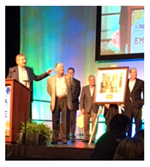 The General Session started with a short video from the Professional Pest Management Alliance (PPMA). Bobby Jenkins, incoming PPMA chairman, honored current chairman
Tommy Fortson
of Terminix Service, for his years of service.
The General Session started with a short video from the Professional Pest Management Alliance (PPMA). Bobby Jenkins, incoming PPMA chairman, honored current chairman
Tommy Fortson
of Terminix Service, for his years of service.
NPMA President Elect Dennis Jenkins was the emcee for the awards. Jenkins outlined the recently introduced NPMA Health Insurance Exchange program, which partners with reputable insurance providers to offer members cost-effective benefit options.
The awards were as follows:
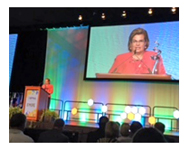
The
2017 Women of Excellence Award
, sponsored by Target Specialty Products, was presented to
Kim Kelley-Tunis
of Rollins. Kim has used her technical expertise and skills as a trainer to further many careers. This award recognizes female pest management professionals who demonstrate outstanding leadership and have made notable contributions to the development and growth of other women in the industry.
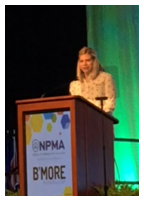 Sarah Thomas-Clark
of Thomas Pest Solutions received the
Young Entrepreneur Award
, presented by Rentokil-Steritech. Sarah started her own company seven years ago, and is dedicated not only to the success of her business, but also to those around her. She has served in several association leadership roles, and is also very active in charitable organizations. This award recognizes young entrepreneurs (40 years of age or less) working in the professional pest management industry who have helped create or develop an industry business and/or those who have stewarded a meaningful industry concept to fruition.
Sarah Thomas-Clark
of Thomas Pest Solutions received the
Young Entrepreneur Award
, presented by Rentokil-Steritech. Sarah started her own company seven years ago, and is dedicated not only to the success of her business, but also to those around her. She has served in several association leadership roles, and is also very active in charitable organizations. This award recognizes young entrepreneurs (40 years of age or less) working in the professional pest management industry who have helped create or develop an industry business and/or those who have stewarded a meaningful industry concept to fruition.
The
Diversity Committee
was awarded
Committee of the Year
. This committee was instrumental in the formation in the Executive Leadership Program, an in-depth curriculum that prepares professionals for association leadership.
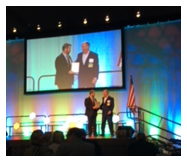
Marty Overline
, Aardvark Pest Management, was the recipient of the
Committee Chair of the Year
. Marty chairs the PestVets committee, which searches for opportunities for veterans returning from service and looking for work. PestVets has created over 3,000 jobs for veterans, and Marty was essential in this endeavor.
The Entomological Society of America awarded the
ACE Professional Award
to
Alan Feuer
. The award recognizes superior contributions of an ACE in the field of structural pest management.
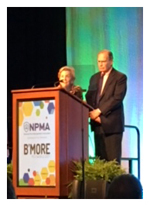 NPMA President Bryan Cooksey, III presented the
Pinnacle Award
to
Judy and Bob Dold
of Rose Pest Solutions. The Pinnacle Award, the highest honor NPMA presents, honors individuals who have contributed
NPMA President Bryan Cooksey, III presented the
Pinnacle Award
to
Judy and Bob Dold
of Rose Pest Solutions. The Pinnacle Award, the highest honor NPMA presents, honors individuals who have contributed
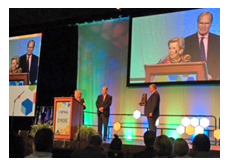 not only to the success of the association, but to the industry as a whole over a lifetime or career. Both Judy and Bob have held high positions in NPMA - Bob was NPMA President in 1984 and Judy in 2001. Both are considered icons within the pest management industry.
not only to the success of the association, but to the industry as a whole over a lifetime or career. Both Judy and Bob have held high positions in NPMA - Bob was NPMA President in 1984 and Judy in 2001. Both are considered icons within the pest management industry.
Please congratulate these very deserving recipients!
|
|
|
Upcoming Meetings
Mark your calendars now for the Annual Meeting, scheduled for
November 12-14 in Lancaster, PA! Registration information and a conference schedule is now posted
here!
The
Meetings and Events section of the website is always the most up-to-date resource for happenings of the Association. Be sure to check it out!
The Eastern Division continues to hold its monthly meetings with varying topics of discussion on the second Thursday of every month at the Crowne Plaze in Trevose. For more information on monthly topics and speakers, contact Sue at (215) 331-1121.
|
The information below represents legislative activity (including bill introductions) that has occurred since the last newsletter. For a full listing of legislation that Versant is tracking for PPMA, please contact us at (717) 635-2320 or cwright@versantstrategies.net. Activity marked HCO or SCO indicates a co-sponsorship memo which precedes the actual introduction of legislation and is designed to secure the support of other legislators prior to introduction as a bill.
After over 100 days without a state budget, the House and Senate has sent a revenue package to the Governor that closes the budget deficit and pays for the small increase in spending included in FY 2017-2018. The proposal includes one-time money transfers from reserve funds, but most notably it includes landmark expansion on gaming. Versant Strategies is paying close attention to the following legislation on your behalf:
HB1001 - Helm, Susan (R) - Act regulating home inspectors; establishing the Home Inspection Licensing Board; providing for licensure & practice, for disciplinary action, for remedies & for penalties; making an appropriation; & repealing provisions.
This bill has passed the House with a vote of 125-63. It will move to the Senate for consideration.
SB 242 - Baker, Lisa (R) - Amends the Underground Utility Line Protection Law (PA One Call) further providing for defs, for duties of facility owners, for duties of the One Call System, for duties of excavators, for duties of project owners, for penalties, for enforcement.
This bill has passed the House and Senate and was approved by the Governor (Act 50).
SB 76 - Argall, David (R) - Act providing for tax levies & information related to taxes; authorizing a personal income tax or earned income tax by a school district; for exclusions from sales tax; for increase to personal income tax; est. Fund; & repeals.
This bill has been referred to the Senate Finance Committee and awaits a committee meeting for a vote.
HB1818 - McCarter, Steve (D) - Act providing for labeling, signage and restrictions on sales and use relating to neonicotinoid pesticides.
The bill was filed and referred to the House Environmental Resources and Energy Committee where it awaits a vote.
|
|
| 10-30-2017 |
11 things you can do to help fight the spotted lanternfly
October in and around the Lehigh Valley is becoming known for something a lot scarier than Halloween. It's the time of year when newly laid egg masses of the non-native, invasive spotted lanternfly become live and viable. Once they hatch, beginning in mid-May, and progress through four immature... - Easton Express-Times |
| 10-22-2017 |
Editorial: Spotted lanternfly invasion requires robust response
The invasion of the spotted lanternfly is in high gear this fall. It will require a robust response from state and federal officials, the agriculture industry and the general public to turn the tide against these repulsive pests that are expanding their numbers and their range with alarming speed.... - Reading Eagle |
| 10-20-2017 |
Doctors Warn Taking Selfies Helping Spread Lice Among Children
PHILADELPHIA (CBS) - Doctors are warning that taking selfies is helping spread lice among children. The tiny bugs are spread by head-to-head contact, so infestations increase when children are in close proximity to each other. School outbreaks are common. 'The Pain Is Worth It': 12-Year-Old Boy From Puerto Rico Set To... - KYW News Radio 1060 |
| 10-18-2017 |
Oh, Rats! Pittsburgh among worst cities for rodents
Cong-RATS Pittsburgh, you dropped four spots in the annual list of the "rattiest" cities in the U.S. Orkin, a pest control company, released its Top 50 Rattiest Cities list Tuesday . For the third consecutive ranking, Chicago took the top spot. Pittsburgh was No. 22, dropping four spots from a year ago. Across the... - Pittsburgh Tribune-Review |
| 10-10-2017 |
Can cockroaches help prevent asthma?
Young children living in households with pests like mice and cockroaches along with pet cats might have a lower risk of developing asthma by age 7, a new study shows. The research published last month in the journal of Allergy and Clinical Immunology contradicts some previous findings that cockroach allergens... - Pittsburgh Tribune-Review
|
|
|